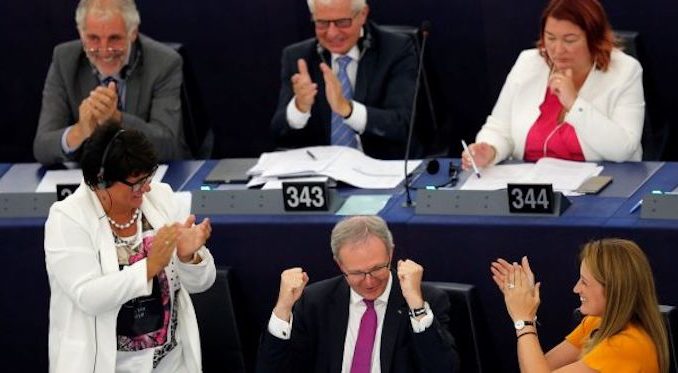
In an unprecedented move to normalize censorship and suppress freedom of expression, the European Union (EU) is taking aim at internet memes and content sharing.
A controversial new copyright law has been passed with 438 votes in favor, 226 against and 39 abstentions to charge aggregators of news and other information a fee for sharing content online.

BYPASS THE CENSORS
Sign up to get unfiltered news delivered straight to your inbox.
You can unsubscribe any time. By subscribing you agree to our Terms of Use
Latest Video
Cnbc.com reports: But critics say such a law would normalize censorship and restrict internet freedom, preventing users from being able to post content ranging from memes to links to articles from news outlets.
The controversy mainly surrounds two sections of the law — Articles 11 and 13.
Article 11 would grant press publications copyright over the sharing of their content online, meaning they would be able to charge services like Google News for aggregating their stories. Critics have dubbed this as an effective “link tax,” but proponents say hyperlinks will be exempt.
Meanwhile, Article 13 calls for “effective content recognition” technology to filter out copyright-protected content. Detractors hold that this part of the law could threaten social media users’ ability to share anything from internet memes to snippets of music and film.
Member of the European Parliament Axel Voss — a key supporter of the directive — said parliament had addressed concerns raised by activists, citing amendments including the exclusion of “small and micro platforms or aggregators” from the scope of legislation.
“I am very glad that despite the very strong lobbying campaign by the internet giants, there is now a majority in the full house backing the need to protect the principle of fair pay for European creatives,” Voss said in a statement.
He added: “I am convinced that once the dust has settled, the internet will be as free as it is today, creators and journalists will be earning a fairer share of the revenues generated by their works, and we will be wondering what all the fuss was about.”
Reacting to the result of the vote, Julia Reda, a German Pirate Party lawmaker, said it was “catastrophic” that the parliament voted in favor of the most controversial pieces of the legislation.
“Final vote for Parliament position on the copyright directive with #UploadFilters and #LinkTax adopted,” she wrote in a tweet. “Parliament has failed to listen to citizens’ and experts’ concerns.”
Final vote for Parliament position on the copyright directive with #UploadFilters and #LinkTax: adopted. Parliament has failed to listen to citizens’ and experts’ concerns. #SaveYourInternet pic.twitter.com/gtGi6rg5kL
— Felix Reda (@Senficon) September 12, 2018
Opponents of the directive have been using the hashtag #SaveYourInternet on social media.
“The legislation is now better balanced, answering many of the concerns of journalists, publishers and musicians whose work was being shared freely online without stifling innovation or fundamentally changing the nature of the internet,” Sajjad Karim, a British Conservative lawmaker, said in a statement following the vote.
“It also takes into account the rights of users, ensuring that materials used for teaching and research, and by cultural and heritage organizations, are not encumbered by unnecessary restrictions.”
What’s next?
Wednesday’s vote won’t be the last you’ve heard about the EU’s copyright reforms.
Lawmakers had initially voted to delay the vote, rejecting the version of the directive that had been agreed by a committee at that time.
Now that politicians in Strasbourg have come to an agreement, the next stage for the law will be what’s known as “trilogue,” which consists of talks between European Parliament, EU executive body the European Commission, and a collective of the leaders of EU member states known as the European Council.
And even once the directive goes through this process, it will still require each individual EU nation to decide on how they will implement the new rules.
The EU copyright battle pits media companies and musicians against tech giants over the widespread availability of their content online. Supporters of the law argue that people and companies in the creative industries are being starved of revenues lost to the sharing of their intellectual property on digital platforms.
It could particularly impact platforms like Facebook and Google’sYouTube, which rely on user-generated content. Google has been accused of lobbying aggressively to prevent the directive from being passed into law.
The issue has drawn attention from notable figures in both the tech and media worlds, including internet pioneer Tim Berners-Lee, Wikipedia founder Jimmy Wales, former Beatles star Paul McCartney and French DJ David Guetta.


